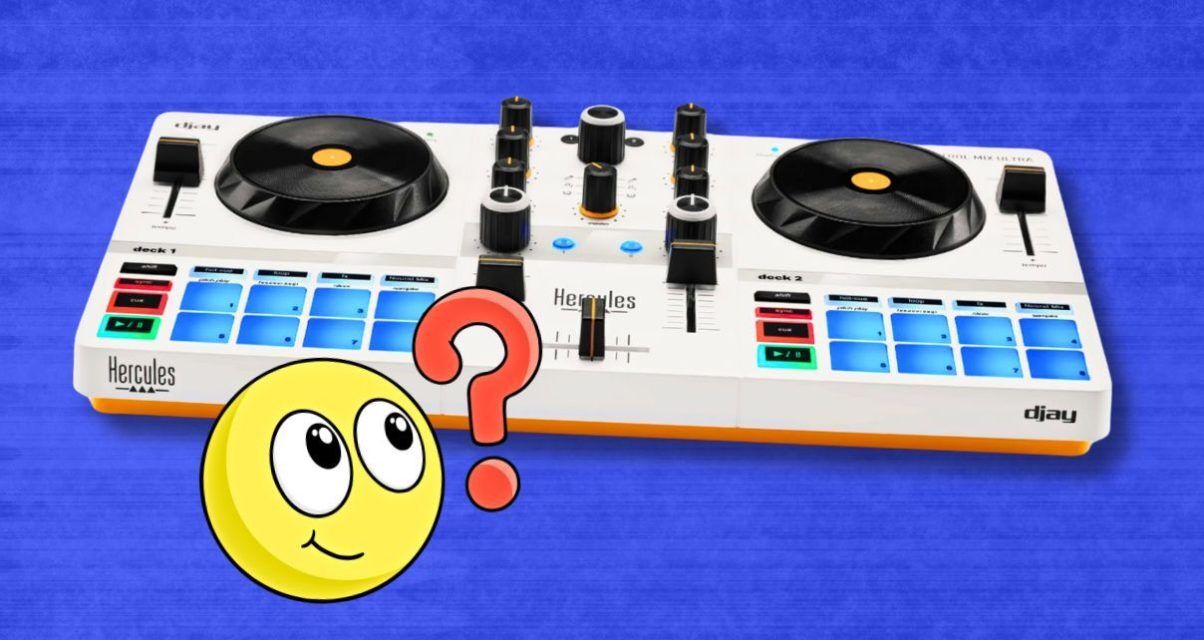Consumer DJ brand Hercules has announced a new DJ controller called the DJControl Mix Ultra, touting totally wireless operation, using streaming services for music via the user’s phone, and wireless speaker technology for playing to the crowd.
With a built-in battery, there are no wires connecting anything to anything. You just turn it on, they say, perch your phone or tablet in the back, launch the DJ app, connect to your speaker, and get going.
It looks like a winner, right? And it literally is, as the CES Show 2025 just gave it an Innovation Award. But is it all as it seems? And is this really feasible for wireless DJing? Sadly, for most people we’d say the answer to that is “no”.
What’s the issue then?
Lots here is good. Using DJ apps with streaming/subscription services to save you buying music is, of course, not a new thing, but it’s a pretty smart thing for casual DJs. Your phone can grab that music over the air with no need to download or buy it, and that’s cool. No cables, no hassle. After all, it’s how nearly everyone listens to music nowadays.
Likewise, the DJControl Mix Ultra has a rechargeable battery and it communicates with the DJ app (Algoriddim’s Djay) running on your phone or tablet via Midi-over-Bluetooth – again, nothing wrong with this. It’s proven technology, it usually has no noticeable latency for software control, and it saves you another cable. (Pioneer DJ’s DDJ-200 did this too.)
And Djay – the software it is made for – is a pretty cool and powerful app, with more than enough to keep DJs of all levels engaged and creative.
Bluetooth audio, that’s what
The problem comes with the implied claim that you can DJ using this fully wirelessly, ie with Bluetooth speakers. To be clear, there is no audio circuitry in the controller at all, it all goes on in the phone, and Hercules is saying you should use a wireless speaker connected to your phone via Bluetooth – just as most of us do for general music listening.
And there’s the big red flag: audio over Bluetooth suffers from “latency”. Ever noticed that when you press “play” on your phone’s music app when listening over a Bluetooth speaker or headphones, it doesn’t start immediately? That’s latency. What this means is what you do on the DJ controller won’t sound from your Bluetooth speaker instantly – and that’s a real dealbreaker for DJing.
Read this next: The Problem With DJ Speakers (& How To Fix It)
Imagine for a moment a musician strumming a guitar but not hearing the sound that the strings make until a noticeable amount of time later. This would not only be off-putting, but it would actually stop the musician from playing properly – and it’s exactly the same with DJing. Yet that’s the tech it seems Hercules is saying DJs should use here. Yet every other DJ controller on the market avoids this, and that’s frankly no surprise.
There’s more, too. There’s no mention of how to plug headphones in – and you cannot. As all the audio is going on in your phone (ie there’s no headphones socket on the unit), and your phone is tied up sending Bluetooth audio to your speaker or speakers, you’re stuck. And that’s a big deal.
OK, but why do you need headphones anyway?
Here at the Digital DJ Tips school, we teach our students that you need four things to DJ right, and those are:
- Two independent music sources
- A way of mixing between them
- Suitable speakers for your performance
- Headphones, to prepare songs with
So you see, without the headphones, you’re unable to DJ properly. To be clear, headphones are used to preview tracks, check blends, and so on.
Learn to DJ with us: The Complete DJ Course
Hercules, of course, did not create these problems with Bluetooth audio. But when a company markets a DJ set-up as “wireless” and yet it uses such tech with its inheret limitations, people like me are (hopefully) all going to point this out.
The Hercules DJControl Mix Ultra is probably fun for the most super-casual of DJs, but I’d wager even they would likely discover its limitations soon enough.
So it’s totally useless?
No. As I say, for just playing songs, it’s probably OK. Also, if you use an audio adapter and the correct cabling, you can kind of fix the issue using the age-old “mono splitter” method – and Hercules is wise enough to realise this and give a cable to do so in the box, although you’d still need a phone adapter to get the headphones output in the first place.
(Likewise, you could attach a four-out audio interface to your phone or tablet and do it properly, but really? C’mon, it’s casual beginners we’re talking about here.)
Our Advice
Don’t buy this unless you’re prepared to use the adaptor/splitter/cable hack, and happy to DJ in mono. Instead, accept that you may need a cable or two in your DJ set-up – it’s no big deal! If you really want cable-free, you’d need to pay thousands for alternative tech that can do it properly. (The Numark Mixstream Pro Go is one notable exception – it’s the only truly wireless DJ controller we’d recommend.)
If you want to get started in DJing with a unit that will serve you well as you learn, you’re better off buying a controller with built-in audio and connections for cabled headphones and speakers. Hercules itself has several options higher up in its range – or, go for what many of our students do and nab our current favourite beginner all-rounder, the Pioneer DJ DDJ-FLX4. Either route would make much more sense than this, CES winner or not.


